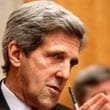The Obama administration and the Democrats in Congress are caught in a political quagmire with respect to the war in Afghanistan. The Washington Post reported on Monday that General Stanley McChrystal has asked Secretary Gates for additional forces to combat the Taliban-led insurgency. Yet, the Democrats in Congress are publicly raising doubts and even urging for a lighter footprint in a conflict that the president has called — in implicit contrast with Iraq — a “war of necessity.”
At a Senate Foreign Relations Committee hearing on September 16, Senators John Kerry and Russ Feingold raised discussion over whether the military presence in Afghanistan should be scaled back and suggested the current presence was even hurting our security interests. “My primary concern with our current strategy is that our massive military footprint may be breeding militancy in the region,” Feingold pondered. Senator Kerry was skeptical that the current counterinsurgency, intended to protect the Karzai government, was worth continuing if all that needed to be done to promote American interests was to keep al Qaeda out of Afghanistan.
Kerry questioned whether American troops needed to be on the ground promoting the Afghan government. Alluding to the raid and killing two days earlier of Saleh Ali Saleh Nabhan, suspected leader of the 1998 Embassy bombings in East Africa that killed over 200 people, Kerry said, “We just knocked out a major al Qaeda figure in Somalia without 67,000 troops on the ground.” The implication is that limited American military objectives left in place in Afghanistan should focus on destroying al Qaeda but not regard the Taliban as an enemy worth fighting or the Karzai government as one worth defending.
Other members of Congress have opposed troop increases in Afghanistan due to the failure of the Afghan army to develop and take control of the country. Progress has been lacking as the Afghan government has deteriorated, and the Taliban has gained control of increasing areas of the country. The president’s adopted strategy in March was intended to address this issue, but success has been limited. “We will shift the emphasis of our mission to the training and increasing the size of Afghan security forces so that they can eventually take the lead in securing their country,” Obama said in March.
Senate Armed Services Committee Chairman Carl Levin (D-Mich.) has said that the administration should not send more combat forces until additional Afghan soldiers have been trained. The problem with this position is that building up the Afghan army would require additional American forces that would face combat situations.
As John Nagl, retired Colonel and co-author of The U.S. Army/Marine Corps Counterinsurgency Field Manual, testified to the Senate Foreign Relations Committee on September 16, the size of the Afghan army would need to roughly double to nearly 250,000 along with 150,000 police officers in order for the government to have necessary forces to control the population, along with the help of existing U.S. forces. In order to substantially increase the size of the army, there would need to be an additional “10,000 U.S. advisers and trainers over the course of 2010,” Nagl testified.
The colonel then underscored that many of these trainers would be put in harm’s way and many have already died in combat. Hence, the position that the United States should not deploy additional forces, but still support a counter-insurgency strategy, seems to be inconsistent.
Some Democrats are being even fiercer in their attacks on the president’s Afghanistan escalation and want forces withdrawn. Rep. Lynn Woolsey (D-Calif.), who serves as co-chair of the Congressional Progressive Caucus, has said that her group overwhelmingly wants American troops to come home.
“The Progressive Caucus is pretty much together on what is going on in Afghanistan, in being against escalating and in favor of bringing the troops home… we will have to stand up to our own president.”
Several factors seem to account for the position reversal by Democrats in Congress on the Afghanistan War. The fact is that Americans have turned sour on the campaign — a recent CNN poll showed 57% of respondents opposing the war. Reacting to the political pressure, Speaker Pelosi expressed doubts about sending more troops. “I don’t think there’s a great deal of support for sending more troops to Afghanistan in the country or the Congress,” the speaker said earlier this month. August was the bloodiest month to date for American forces in the Afghanistan War, with 51 American forces killed, with deaths roughly on pace to match those fatalities in September.
The president said on CBS’s Face the Nation that he ordered the 21,000 troop increases to the level of 67,000 Americans “to make sure that we could secure the election.” However, the election results have been widely panned as widespread evidence of electoral corruption by Hamid Karzai allies has surfaced, similar to the methods used by Ahmadinejad forces in the stolen Iranian elections. If the image of the Afghan government continues to deteriorate, calls will increase for troop levels to be scaled down.
The president has re-calibrated some of his rhetoric lately to emphasizing the need for the Afghan mission to fight al Qaeda. However, al Qaeda is not believed to be in Afghanistan.
Without the clear articulation of a mission and strategy in the coming weeks, the president could be in for a rough ride with his own party and antiwar base. Obama will not want to appear soft on fighting terrorism, while many Democrats in Congress will be looking for the exits. The president may try to strike an uneasy balance or rely on the GOP in order to keep the Afghan government from complete collapse.
























